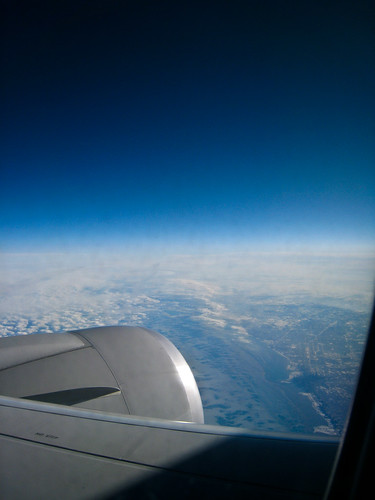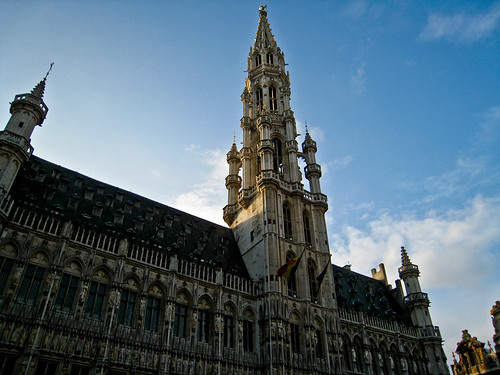My laziness has subsided and the majority of pictures from my trip to Paris and Brussels have been uploaded.
I started on January 15, 2009, with a flight to Newark, New Jersey to meet-up with my friend Steve for our flight to Paris. The Boeing 777 was nearly empty, with passengers only in every other row. This gave me a chance to stretch out and make a bed for myself, leading to some decent rest before arriving in Paris.
Because of amazing tailwinds (upwards of 200 mph), we arrived in Paris in five and a half hours, leaving us to stand in the immigration line for an hour before it opened. A quick trip to Gare du Nord train station to lock up our bags and we were off to explore the city. Notre Dame was the first stop, complete with a self-guided tour. There is a lot of begging that takes place outside on the steps of the cathedral with young girls coming up to tourists asking “Speak English? We need money”.
The next stop was the Louvre and the Arc de Triumphe, both of which are a little underwhelming but interesting. However, I was fascinated with the efficiency of the Paris Metro, especially when I compared it to the system in Brussels (more on that later). In Paris, the trains were on time, for the most part clean, and the system maps were easy to understand.
After the Louvre we decided that our time was limited if we were to catch our high speed train to Brussels, so we made our way back to Gare du Nord, grabbed our bags and hopped on the Thalys, the high speed option to a bunch of different destinations in northwestern Europe. Going 180mph through the French countryside was an experience with closeup objects going by in a blur. The trip only lasted an hour and a half and by 6pm we were in Brussels.
Brussels has life. Not the kind of life you see in Chicago or San Francisco where it is abuzz with busyness but the kind of life where people are cordial and everyone seems to enjoy each other and the city in a pleasant manner. There is a big tourist element and some of the local businesses prey on travelers and their wallets. I noticed my back pocket being brushed a little more than usual, though, I know this is a problem all over the world. The other type of preying I saw was restaurant owners/workers doing a kind of bait-and-switch where they offer great specials outside just to lure customers in, then change prices once the people are seated. My understanding is that the Belgian authorities are attempting to eradicate this behavior and maybe in the near future it will be complete history.
The beers in Belgium deserve their own paragraph, not only in a literary sense but by demand of the taste buds. I do not think I tasted a single bad beer, every single one was pleasing to the palette in their own way. There were a few that I did not prefer, but not because they did not have flavor. All beers brewed in Belgium are required by law to have their own glass, so walking into a pub in Belgium is a lesson in glassware. The bartenders have also mastered the art of pouring beers dependent on their type and each have their own artful way of getting the beer from the bottle to the glass. My favorite beer while there, Chimay, was dark with a fruit and nut after flavor and it lacked the bitter undertones that make dark beer so difficult for people to handle.
The Brussels public transportation system is a complete opposite from the beer. It might be the worst public transportation system in the world, ranking right up there with the BART in San Francisco in terms of platform smells. There are maps of the system everywhere, the only problem is, they are all in different languages and none explain that some “trains” are in fact, buses. So, you walk into a subway station thinking you are catching a train, when in fact you have to be on the surface catching a bus. Not a user friendly setup.
Overall, Brussels is well worth a visit. From beer to food to sights, the city has a lot of them and there is even more outside of Brussels, including Brugge and Antwerp, which are rumored to be wonderful cities.
To see more pictures from Paris, Brussels, and the flights, click here.


